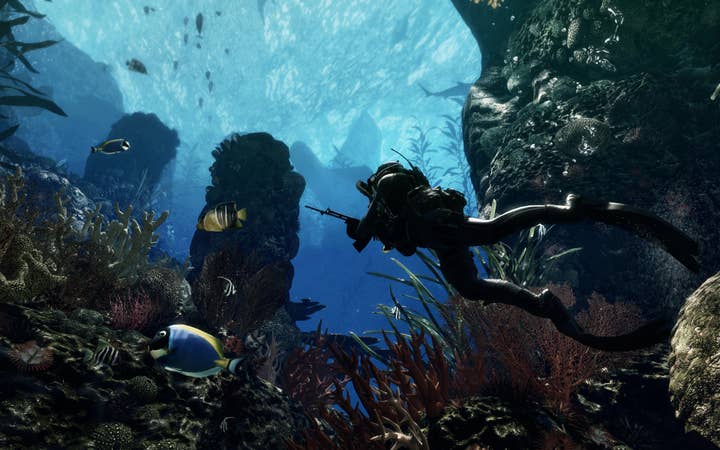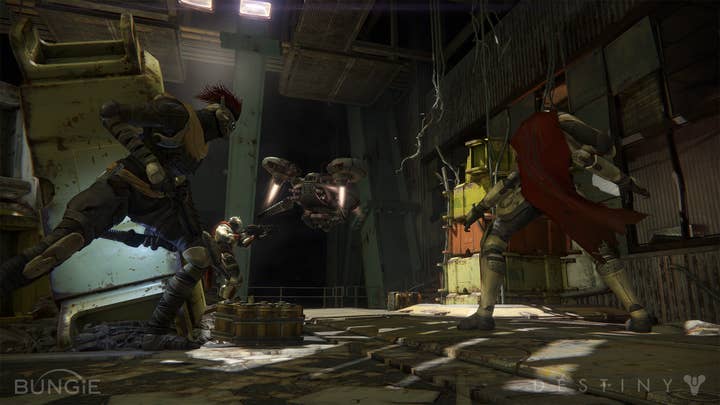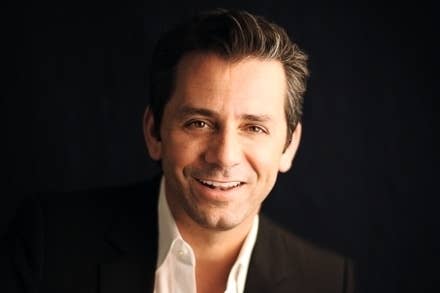Activision: Microsoft has to prove Xbox One's premium price is worth it
Eric Hirshberg talks next-gen, how consoles will continue to be a stable market, and why ATVI is very careful with investments in mobile
Activision Blizzard is sitting pretty. While some have struggled in this extra long console cycle, Activision is the only publisher that's consistently seen its revenues and net income increase each year. It's a testament to the strength of core brands like Call of Duty, Skylanders and World of Warcraft, but it also speaks to a very careful and deliberate strategy from management.
It's this same strategy that often yields the company much criticism from some industry pundits. While rival publishers like EA are making substantial investments in digital and mobile, Activision has been dipping its toes, rather than fully diving in. In a recent phone interview with GamesIndustry International, Activision Publishing boss Eric Hirshberg noted that many "misinterpret" his company's very careful approach to mean that it's not interested in other growing markets like mobile. At the same time, he stressed the continued importance of the console sector, and gave his frank opinion that Microsoft will have much work to do in convincing consumers that $499 with a Kinect bundled in will be worth the investment.
The full interview below also goes into detail on the massive investment in Call of Duty: Ghosts, Bungie's Destiny, and how games have become "the entertainment medium of choice for a generation."
It's up to them to win the value argument. If you do a focus group of a gazillion people and you show them two prices for two competitive products, 100 percent always prefer the lower price. I think from a first impression standpoint the win goes to Sony, at least as it relates to pricing. Microsoft is going to have to win the hearts and minds and convince people that the higher price point is worth it, and that it provides really meaningful capabilities that will be meaningful to consumers. And it's a long game, so I am sure that's what they intend on trying to do.
I think it's the same answer; I feel they have to show why that's a good thing and why it's worth the premium and deserves inclusion and why it's something that gamers are going to come to really value and appreciate. … It's going to be a fun battle to watch, but I think they definitely have to win hearts and minds in terms of the value of it.
"We're in the business of blowing minds and providing huge experiences. It's a critical year and it's a critical transition, and we're going to spare no expense to make sure that we have the best game"
I don't think we're slower to move; we're a very choiceful company. We're very choiceful in the number of titles we make. We scrutinize opportunities very carefully, and when we go into them we go big. And I think that's been part of the formula for our success. We were there with a lot support for the Wii U at launch with a Call of Duty game, with a Skylanders game and with several other titles. We want to see Nintendo be successful and we want to do anything we can to help them be successful. Obviously the Wii U is struggling - that's not a secret, I don't think there's any other way to read the narrative right now - but they're a really good company and they've got some incredible IP that has yet to come, that they honed for that platform. We have a vested interest in making them successful.
I think that's a fair deduction. We don't talk about our budgets but we're developing for [many] different platforms with next-gen and current-gen and it's a very complex development process. And then you have all the stakes that come with a new generation of hardware, the expectations, needing to set the gold standard for next-gen, win people over and make sure that our audience comes with us to the next generation. Look, it's not for the faint of heart. When you're on top you've got the rest of the industry gunning for you - excuse the pun - and you also have the toughest competition of all which is ourselves and our past success and exceeding our gamers' expectations.

And that's where we focus. It's easy to get lost in the echo chamber and it's easy to get lost in the several different tempests in several different teapots at any given time within the industry. We have a 30-million person community to satisfy and they are playing our game in record numbers and our business has never been stronger. The engagement has never been stronger in the length of the tail on Black Ops II and the level of engagement we're seeing this long after launch, the success of the DLC and the season pass. Things are really good and we've got a really passionate player base that we think is the best in the world and we are never going to let them down.
Obviously we need to realize whatever efficiencies we can and be responsible stewards of our company's money and our shareholders' money, but at the same time the most responsible thing we can do as leaders in the business is to deliver a kick-ass experience on every single platform, and to continue the Call of Duty juggernaut. There is no way out of town that doesn't include quality, that doesn't include excellence. There's no way to save yourself to greatness in this business, and we're in the business of blowing minds and providing huge experiences. It's a critical year and it's a critical transition, and we're going to spare no expense to make sure that we have the best game.
It depends on speed of adoption rate and how well the first parties do of winning hearts and minds. The PS2 was relevant for how many years into the current cycle? It had a long tail. You could see something like that happening again. We've always been platform agnostic; what we care about is delivering the best experience for gamers wherever they want to play and however the delivery mechanism plays out. We put all that stuff secondary. … It's a high-stakes strategy but it's where I want to be because it's all about creative excellence. That's where you win or lose, whether or not you provide a great experience for people.
"I think it's a very fair assessment to say that we haven't gone as big in some new platforms as some of our competitors have, but we've got a pretty good track record of figuring out how to get into businesses at the right time"
Everything you just listed we've had various levels of investment in, so it's not that we are against those things. I think a lot of times people mistake our focused strategy as a company as some implicit criticism of a new medium or new opportunity. And it's not that - it's just that we're very choiceful and that's so the things that we do do we can do the best possible job at. We don't want to fracture our focus, we don't want to fracture our resources, we don't want to fracture the attention of our best, most creative, most talented people.
And it's hard to argue with the results. It's been a winning strategy. It leads to Call of Duty still defying gravity long after people thought it would have stopped. It leads to bold new IP like Skylanders and big new investments in things like Bungie and Destiny. So when we go into something we want to go big, because that's how we know we succeed the most. We've built great capabilities in mobile, for example, and we put out some very well rated mobile games, three or four of which made to the tops of the charts last year. The way we're strategizing about that right now at this moment in time is that those are best served as extensions of our core franchises, but that doesn't mean we don't see the obvious potential of mobile.
It's just that in terms of where we are focusing our energies right now is in a different area. But we are building capabilities, we approach things cautiously and thoughtfully, and then when we pull the trigger we go big. I think it's a very fair assessment to say that we haven't gone as big in some new platforms as some of our competitors have, but we've got a pretty good track record of figuring out how to get into businesses at the right time when the market matures to a place where you can make a big impact both for gamers and for the business. That's our orientation and I think sometimes people misinterpret it.
It's not that there aren't games that are not making a lot of money. It's just that there are only really a handful that are monetizing on that level out of the 300,000 or 400,000 games on the App store. And also, we haven't seen on the App store that sort of franchise effect, meaning getting to that upper echelon seems to be a very different thing than staying there or being able to create any loyalty or a repeat audience, which is different than what you see in consoles and other platforms where you really can build a franchise. That's expressed by the fact that the top mobile games change out every couple of months. There are a couple notable exceptions to that and that's encouraging.
But I would look at it differently and say when Bobby notes that he doesn't see anything that would change our investment, it doesn't mean we're not investing. It means we're taking a very particular approach where we are building capabilities as opposed to something like making a giant acquisition, for example. We've built a lot of capabilities. We've got a lot of capable people making mobile products and mobile games working here at Activision right now on really great products, some of which are highly rated and have done really well on the marketplace, so we're definitely investing and making good things.
"The console market has proven itself to be one of the more stable ones in all of entertainment. It has shown far more staying power than any other gaming platform ever"
This person doesn't work at Activision? I have no comment on that.
That's a big if! The console market has proven itself to be one of the more stable ones in all of entertainment. It has shown far more staying power than any other gaming platform ever. Yes, we can hypothesize about meteors hitting the earth that would render anybody's business strategy ineffective. And I would also point to our history, at a time long before I was at the company, where people used to prognosticate that Activision was slow to respond to PC gaming and to MMORPGs as well. I think we've shown a pretty good ability to make the right moves at the right time, to a) bring people games that they want to play, and b) do it in ways that we can realize a good return on our investment. I don't see that changing.
We have a small division that concentrates on licensed games and I think we make right size investments against those opportunities. It's not obviously a primary focus of the company but it is a group that does well. Those games are nothing new, and a number of those games you referenced like Spider-Man are part of contracts and have been with the company for a while.
There is no plan to do that currently. Obviously we are doing this with Call of Duty in China because that is by far the accepted mode of doing business in the Chinese game market. If free-to-play becomes appropriate for other markets, the learning that we're doing in China and the development work that we are doing to turn it into a robust and well executed free-to-play game will of course be beneficial.
Sledgehammer is not involved in Call of Duty: Ghosts, but they are still involved in the Call of Duty universe and we haven't made any announcements about what they are currently working on yet. As with most Call of Duty games in our recent past they've become very big productions, and it creates opportunities for multiple studios to contribute.
Well that's obviously what we did on Modern Warfare 3, and we have other studios contributing to Ghosts. It's something that we do on an as needed basis and luckily we've got great developers who are able to contribute to making great games. The scope of the games is very ambitious and there's a lot of things we're trying to pack into them. We've long gotten credit for being a very complete package in gaming with many different game modes and lots of different ways to enjoy the franchise. That takes a big investment in human resources and talent. Raven and Neversoft are contributing to Ghosts and doing a great job alongside Infinity Ward.

I think that there's a general tendency to look at continued innovations and iterations on themes as somehow being destructive to things that came before it. I think what oftentimes happens is colors get added to the palette; they don't wipe the other colors out. I think you are seeing a response to both the popularity of multiplayer from the current generation as well as some of the new capabilities in next-gen hardware with some people experimenting with bringing those two worlds together.
I think that certainly describes some of the innovations that we are attempting in Destiny, for example. But whether or not that will somehow be destructive to the popularity of a really incredibly fun game mode like multiplayer in a game like Call of Duty, I don't see any reason why it would. But I don't look at it that way. I look it as what's the right thing to do for this game? What's the right thing to do for this audience? For Call of Duty there are plenty of innovations that we have planned for multiplayer. Bringing it closer together with campaign isn't one of them. But that's because we are responding to the audience, the usage and the spirit of Call of Duty. So that's why we are adding things like dynamic maps and character customizations, because we think that's going to make it a better game.
Destiny is obviously a ground-up new intellectual property, and one of the things that Bungie wanted to play with was live encounters with other players in that shared world shooter idea. And I think that's a really cool idea, which hopefully also will be really compelling, but I don't think one replaces the other and I don't think they're mutually exclusive or destructive to one another.
We make games first. It needs to be a great game and great experience first. If there is a reason that another medium can enhance the game experience or enhance the game universe, that's something we will play with, but we've been cautious about that historically because you can ruin a perfectly good game franchise with one bad movie, for example. There are plenty of case studies to prove that.
I think there's also a misperception in my mind that if a game really makes it and becomes a phenomenon, then it can become another medium, it can become a movie or a television series. I don't look at it that way; I think games are the entertainment medium of choice for a generation and I think that making a great game franchise is challenging enough.
It's funny the way you articulated the question, because you just described all the reasons why people used to say we shouldn't get into the kids market. It literally used to be 'people are getting out of the kids market, and the Wii is faltering, so why are you guys getting into the kids market?' when I would defend our decision to make Skylanders. Now you are reversing it and saying it's an unfair advantage. I think Skylanders is successful not because it is a kids game without a lot of competition, because to your point, a lot of kids games - no matter how thin the competition - haven't succeeded of late. Skylanders is successful because it's a really magical idea and it's brilliantly executed. We have created a really compelling new genre that brings toys and games together, and a new play pattern for kids that brings interactive play and analog play together in a really fresh way. The games continue to innovate and... we are going to have to deliver really compelling ideas each and every year.

